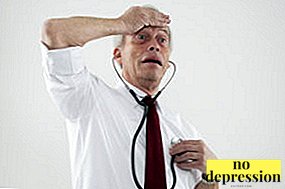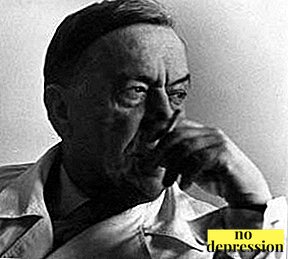Many anxious people tend to worry too much about their own health and look for signs of various diseases.
Such people are called hypochondriacs. The features of the symptoms and treatment of hypochondria depend on the cause, type and severity of the disorder.
What it is?

Hypochondria, or hypochondria - This is a mental disorder in which a person is constantly worried about the state of his health, listens to the sensations he is experiencing, and is inclined to attribute to himself various dangerous diseases.
Patients often talk about their complaints and health problems, they may begin to perceive the natural reactions of their own organism as pathological and look for ways to eliminate them.
Attempts to persuade them tend to react negatively, sometimes with aggression (reactions depend on the individual characteristics of the patient).
Ambiguity, anxiety, and increased concentration on health, which are an integral part of hypochondria, over time lead to negative changes in the patient's character, which create difficulties in communicating with others.
Because of this, many hypochondriacs are left alone, which is even more impairs their mental well-being.
Negative traitsobserved in hypochondriacs (especially in cases where the disorder persists for a long time):
- the desire to often talk with others about their health, to complain about it (while people belonging to the patient's health are not sensitive enough, can be blamed for callousness, indifference, selfishness);
- reduced or absent interest in various hobbies and areas of knowledge (this is due to the fact that their well-being becomes the center of life of hypochondriacs);
- using their own, usually fictional, ailments to put pressure on others.

Also people with hypochondria seek to visit hospitals regularly looking for doctors who will confirm their concerns.
If the doctor tries to convince the hypochondriac that everything is in order with his somatic health and he should turn to a psychiatrist, he will react negatively (anger, irritation, tears, reproaches, threats, etc.) even if he is provided with weighty evidence.
At the same time, the severity of hypochondria can vary, in some cases it provoked by psycho-emotional shock and over time passes independently.
According to some studies, about 14-15% of all people who come to hospitals for help are hypochondriacs.
Causes
The main causes of hypochondria:
- Parenting style. Tendency to hypochondria may be due to the peculiarities of the child's upbringing: children overrepresented by their parents or other close relatives are more likely to worry about their future health. This is most characteristic of the format of hyper-care, in which the parents are anxious about the child’s health, they constantly muffle him, frighten him with diseases and go to the hospital with the slightest problem.
- Psycho-emotional shock. Hypochondriacal disorder and hypochondriacal neurosis can occur in cases where a person has experienced or is still experiencing serious stress.
This may be something related to diseases (a relative's illness, observation of his sufferings, the appearance of fear of becoming the same as he), or something that is not related to them.
- Personality Features. People who have an increased emotional sensitivity, anxious, suspicious, are more likely to suffer from hypochondriacal disorder and other disabilities, such as obsessive-compulsive disorder, anxiety disorder.
- The presence of other mental disorders. A person who has suffered for a long time from the impact of acute psycho-traumatic factors, who tried to cope with mental illness, becomes more vulnerable due to the general exhaustion of his own psyche.
- Light and moderate brain damage in historyas congenital (injuries and adverse effects in the process of prenatal development) and acquired (acute or chronic poisoning with toxic substances, traumatic brain damage, complications after illness).


Hypochondriacal Disorder personality is more common among women over forty and in men over thirty.
Hypochondriac neurosis most common in older adolescence and in people who have stepped over sixty years.
Signs of pre-hypochondriac state
Before a person has a full-fledged hypochondria, the following features can be observed:
- Increased interest in your own well-being. A person listens to himself, may notice some disturbing changes. At the same time, he realizes that his anxieties are not supported by him, and he keeps himself in his hands.
- Concern about the possibility of a dangerous disease. But, as in the previous case, the person is still trying to keep himself under control.
Pre-hypochondriacal state is not always goes into full hypochondria.
Often it is a response to psycho-emotional shock: for example, a person buried a relative who died from a serious illness, and cared for him while he was alive.
Symptomatology

The main symptoms of hypochondriac neurosis and hypochondriacal disorder:
- Senesthopathy. These are unpleasant, sometimes painful sensations that can be localized in different parts of the body and sometimes change their location. At the same time, the organ or area in which senesthopathy has arisen has no pathologies that could explain the sensations. Complaints of patients are extremely diverse, but usually associated with either pain, or paresthesias (numbness, burning, goosebumps, etc.).
- Fear, anxiety. Patients are worried about their health, constantly looking for signs of dangerous diseases. With obsessive form Hypochondria panic, fear of possible diseases are extremely strong and exhaust patients.
- Hypochondriac convinced that he was sick, and trying to convince everyone else. However, most of them fail to convince, even if there is evidence in the form of survey results. Some patients, coming to the doctors, have already made a mental diagnosis in advance and are trying to draw it to the same conclusion.
Suspicions of the hypochondriac may change over time: for example, initially he was sure that he had heart failure, and then decided that he had signs of coronary heart disease.
- Concentration on your own well-being to the detriment of other areas of life. As mentioned earlier, patients often have little or no interest in everything that is not related to their health.
- The desire to over-care for their health. Most characteristic of overpriced form. The patient spends a lot of time in order to create conditions that exclude the possibility of becoming ill with something, often begins to delve into the pseudoscientific areas in order to find effective methods of prevention (for example, he may starve or take questionable decoctions).

With hypochondriacal neurosis usually, symptoms characteristic of neurosis are added: emotional lability, sleep problems, irritability, depression, feeling tired, lack of desire to do something, apathy, loss of appetite.
Senesto-hypochondriac syndrome - This disorder, the first sign of which - the occurrence of senesthopathy. Later, other symptoms characteristic of hypochondria appear.
Delusional form of disorder occurs infrequently: serious mental illnesses, such as schizophrenia, are usually necessary for its occurrence.
A patient with hypochondriac delusions is inclined to build absurd chains of conclusions, for example, he believes that “the doctor has been looking at the test results for too long, this probably means that I have cancer, he just wants to hide it.”
How to fight: the advice of psychologists
I am a hypochondriac: what to do, how to stop them? How to get rid yourself of hypochondria? Key recommendations:
- Learn to trust your close people and doctors. Ask the doctors questions, be polite. If the survey did not show any disease, try to realize that it really does not exist and that this is not someone’s mistake, but a fact. Determine for yourself the frequency of preventive examinations (for example, once every two years) and stick to this schedule.
- Diversify your own life. More often walk in the fresh air, engage in physical activity, find a new hobby or think about what interested you earlier.
- In the evenings, try to be in a relaxed atmosphere. Take a bath, take a course of mild sedatives based on herbs (for example, motherwort tincture or valerian tablets).
- Look less often at medical articles. The hypochondriac, who reads the symptoms, begins to wind himself up additionally, check his sensations with what he reads. Even accidentally seen material can stir up anxiety. Therefore, the best option is to ban yourself from studying this information.
- Do not consider or discuss your health with others. Thoughts largely determine how people feel. If a person is constantly focused on well-being, speaks about him, thinks, his condition will only worsen.

These recommendations will be useful to those hypochondriacs whose disease is mild, not burdened by other mental illnesses, and largely provoked by psycho-traumatic experience.
Otherwise, eliminate self frustration. will not succeed.
Treatment
How to cure ailment? Like most other mental illnesses, hypochondria is treated using psychotherapy. The attending physician determines on an individual basis whether to place the patient in a hospital or if there is enough treatment at home.
The following types of psychotherapy are used in the treatment:
- family psychotherapy;
- psychodynamic therapy;
- gestalt therapy;
- rational therapy and cognitive-behavioral therapy.

Features of treatment depend on the symptoms, causes of the development and severity of the disease, the presence or absence of other mental diseases.
Before starting treatment of hypochondriacal disorder the patient must undergo a full examinationso that any somatic pathologies causing sensations that he is experiencing can be excluded.
Medicines are selected individually. They are prescribed carefully, because some patients, receiving drugs, may decide that in fact they are being treated for some other dangerous disease, they simply hide it.
It is useful to take baths with soothing herbs and engage in physical activity: it favorably affects sleep and general well-being of patients.
In the presence of sleep disorders, drugs from the benzoniazepine group may be prescribed (Diazepam, Lorazepam). If the patient has additional mental illnesses, appropriate medications are prescribed.
Prevention of Disorder

Eliminate the likelihood of developing hypochondria is quite difficult, especially in adulthood.
An adult can only work with the consequences of what he already has.
Hypochondria prevention must start from the moment the baby is born: It is important for parents to find a harmonious balance between hypertreatment and detachment, to ensure that the child often walks, is active, not concentrating his attention on his own well-being.
If an adult notices signs of hypochondria or initially knows that he is prone to its development, he it is important to consult a psychologist, psychotherapist and get recommendations.
About hypochondria in this video:



